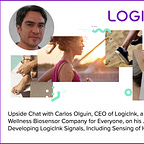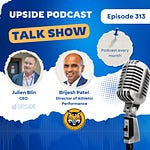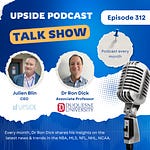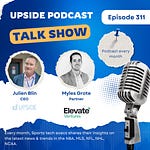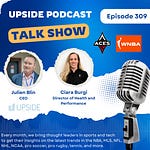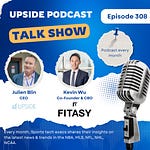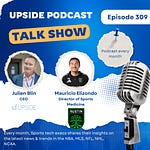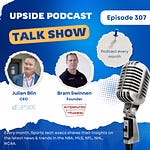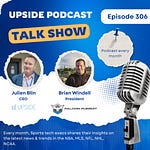This week we have the honor to interview Carlos Olguin, the CEO of LogicInk a leading wellbeing biosensor company for everyone.
Powered by programmable chemistry and biology, LogicInk is a San Francisco-based company developing biosensors called Signals. LogicInk Signals come in two form factors. In one case they can be worn like a temporary tattoo with a colorimetric display that dynamically changes to inform users about a condition of interest (e.g. get a safe healthy daily UV dose from the sun). A second form factor, currently in development, is a thin device with a sterile applicator that is licked and once inserted into the device it gives users a quick one-time health indicator. Applications include the readout of electrolyte levels and how that can correlate to hydration levels.
📝Show Notes: Through this interview with Carlos, we touched on his background, his company, product, and competitive advantages. We also touched on the benefits for the teams and athletes to use its products. We also discussed his business model and his plans for the next 12 months.
🚀Best Quotes: Here’s some of the key discussion points and best quotes from our conversation with Carlos:
On his background:
“ I'm originally from Mexico where I did my undergrad. I studied electrical engineering. Then I went to the US to study computer science at Carnegie Mellon. And after that I studied [biomedical engineering] at Columbia University. Although I didn't finish that degree, I was already running a corporate research group at Autodesk, a software company for designing engineering tools. And it was at that time that we decided to create this startup outside of Autodesk”.
On how he got the idea of launching LogicInk:
“So the initial vision of the company was about functionalizing body-based self-expression meaning that we saw that tattoos are ever more so common, especially in younger people”.
“And at the same time it was an amazing opportunity to be able to functionalize them and show something that is important to you and also that could be concealed because it doesn't need to be something that everybody has to know and that can be very personalized. So that's how we started the company from that vision”.
On how he decided to focus on DNA nanotech:
“And then connecting that to, in our specific case, we're mostly focused on DNA nanotech and to some extent CRISPR-Cas systems. And we just like the idea that we're making a deep tech-enabled consumer-facing application”.
On its backers (Village Global, Thiel Foundation, Metaplanet):
“Our investors are VCs who are, in the case of Bill Gates and Jeff Bezos, who are backed by them and many others. So that group is called Village Global. It's is an amazing team”.
“It's not only Jeff Bezos and Bill Gates, it's also Mark Zuckerberg and many, many other prominent people in Silicon Valley mostly. Besides them, there's the Thiel Foundation that is part of the Peter Thiel umbrella. It's the super early stage fund. Also we have the support from people like Jaan Tallinn, who's one of Skype co-founders through his fund called Metaplanet”.
On his focus and vision to detect sequences of DNA or RNA in saliva:
“Our main focus is in actually creating a platform that we call Genetic Signal. And once completed we'll be able to detect arbitrary sequences of DNA or RNA in saliva with the same sensitivity or similar sensitivity to PCR, which is the benchmark in testing of nucleic acids”.
“But the challenge with PCR systems is that that they're very expensive. They require traditionally a central lab, and they don't scale, and they're difficult to use. They also require batteries. They're not something that we would just use in the field or at home very easily”.
“So what we are working on is in a next generation, highly sensitive molecular test platform called genetic signal that won't have the same applications that you use for PCR, meaning from the early detection of cancer, long before symptoms appear to neurological diseases, to basically every single thing where you hear PCR. We will be able to replace or expand those markets”.
On his plan to release a product that can detect athletes’ hydration levels in the future:
“So we came across this idea that we could use a subset of that [Genetic Signal] technology to be able to detect hydration levels, for example, in athletes or also in the elderly population, or even for other applications such as preserving the safety of field workers, and farmers, et cetera. Now our main focus is in athletes, but I just want to make sure that it's clear that it can be used elsewhere, and we're excited about that”.
On the great amount of interest for his upcoming product he is seeing in pro sports right now:
“We're seeing, thanks to amazing sports advisors, including former world champions and just people who are highly connected to pro league sports, we're seeing an incredible traction in this direction. And just to be completely honest with you, that is incredibly important for a small startup that has a big vision, but has to also show market validation if it's going to be able to achieve its maximum potential. So we're excited about that direction”.
On the fact that its hydration assessment device is very low cost, can assess the hydration level quickly by analyzing silva:
“We think we're close to delivering something that can make a difference in athletes’ routines so that they don't need to be taking urine [specific] gravity tests or something more invasive. And then they can easily get a sense of their hydration levels, but with just a quick saliva sample”.
“And I think what's interesting also is the low cost. It's going to be very low cost. And you can get the results almost right away”.
On the fact that LogicInk’s hydration assessment device will helps teams reduce soft tissue injuries as well:
“And again our expertise is in biosensors, but what we're learning from experts in sports, and by talking to pro-league teams is that is not just the fact that it's something that is easy to use, but the main goal or one of the underlying goals of getting athletes tested is that by ensuring that they're properly hydrated, we are reducing the risk of soft tissue injury, which as you know, is very common”.
“When you're dehydrated, your muscles become tense. When muscles are tense, sprains and tears are common. So in a way, we're just [...] helping an athlete by empowering them with information so that they can stay properly hydrated [improve performance] and reduce the risk of soft tissue injury, which is important”.
On their product’s competitive advantage such as its low cost approach, ease of use, and form factor:
“One challenge with sweat patches is that they require you to perform exercise and sometimes for a long time such as 20, 40 minutes, and even more time sometimes”.
“So you can imagine that if you have an athlete that is already dehydrated, and starts to do exercise just to learn that they're dehydrated, you are incurring in a higher risk of injury, whereas if you can take a quick saliva sample, sometimes even the night before, you know when you can do something about it in time. That is a more productive use of a biosensor. So I think that is one competitive advantage we have, that we can assess hydration levels before you begin to exercise and also after”.
“And then the other competitive advantage is that the form factor is so simple to use and the cost is so significantly different than let's say electronics-based devices that are out there, that it just makes it easy for everybody to use, whenever they think they need to test for their hydration levels”.
On their business model:
“We're a small startup at this point, and the most direct way to get to market right now is through B2B partnerships. However, as we keep growing ultimately to be able to reach our growth goals, we will build up skills in the team, acquire new skills so that we can execute a B2C, go-to-market strategy that follows the B2B launch. That's our goal”.
On their plans for the next 12 months:
“We are determined to finish an MVP of the hydration signal so that we can start running pilots in the second half of 2023, at which point we will be ready sometime in the first half of 2024 for a broad release of the hydration signal”.
“And then in parallel to that, we also want to make sure that within the next 12 months, we can already start to run pilots for the genetic signal platform, which is this PCR-equivalent platform that that can be used at home or in the field without any instrumentation or batteries”.
“And therefore, it is a massively scalable approach to PCR testing. And by the way, our initial focus, as far as we know today, will be in the sports market. And I can't wait to tell you more as we become more public about that”.
On how to reach out to Carlos:
“You can reach out to me at carlos@logic.ink “.
You may also like:
⭐🔎📈 EXCLUSIVE: Introducing the New Upside Tech Scouting Platform for Teams, Vendors & VCs.
💦Upside Analysis: The sweat and heat sensing market (Key Trends, Vendors)
🔥 Upside Chat: Dave Hancock, CEO, Apollo (Leading Athlete Management Systems (AMS) vendor)
🔥 Upside Chat: Ismael Fernandez, ThermoHuman CEO
🔥Upside: AMS Ecosystem Analysis: Key Trends, Vendors and Recommendations to Teams

